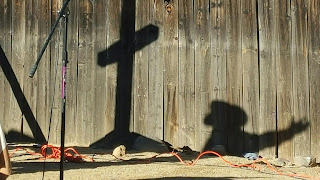Simon and the Sinner (Luke 7:36-50)
Journey with Jesus to the Cross (Wednesday, March 16)
I would love to have been there when the “sinful woman” crashed Simon’s party. It’s one of the most beautiful stories in the gospels.
Jesus is invited to dinner at the home of a Pharisee named Simon. Is he a secret disciple? Is this a private interview, like the one between Jesus and Nicodemus in John 3? After all, he has shown hospitality to Jesus by opening his home to him— not something to be taken lightly in any culture, especially in those days.
Suddenly, an uninvited guest steps into the scene. We see from the start that she is out of place in this gathering, for she is “a woman of the city, … a sinner.” She cautiously – or brazenly – makes her way to Jesus.
Clearly, she has something on her mind. What is she thinking? She must know she doesn't belong here. Pausing behind Jesus and holding an alabaster ointment jar in her hands, she is unsure what to do next. Soon her emotions get the best of her and she begins to weep.
Moving quickly, she bends down to anoint Jesus’ feet with oil. As she does, she is overwhelmed with emotion, mixing oil, tears and kisses in a poignant baptism of love. But she has forgotten a towel. What will she do? Without thinking, she lets down her hair to dry his feet.
The dinner party lets out a collective gasp. Everything about this is wrong. No self-respecting woman would let her hair down before another man except her husband. But then, this is not a respectable woman. The atmosphere was electric. What will happen next?
You’ve read it, so you know. As if ignoring the woman, Jesus tells Simon a story about debts forgiven and love expressed. Then he drops the bombshell, saying in effect, “Simon, you have disrespected me in every possible way: no water for my feet, no welcome kiss, no oil for my head. This woman has offered me the hospitality you refused to give me, and she has done it with a sincere love you know nothing about.” (He doesn’t say it, but he might as well have: “You are the one who has acted shamefully today — not her.”)
Until now, the woman has only been talked about; now Jesus speaks directly to her. He touches her face, lifts her chin, and looks into her eyes. With a depth of love she’s never before seen, he says to her, “Your sins are forgiven…. Go in peace.” Whew! What a moment!
Like a beautiful piece of art, we linger before this beautiful scene. We can’t help but muse: where am I in this picture? Am I Simon: smug in my spirituality, condescending toward those who haven’t got it together yet, and critical of those who accept them?
Or am I the woman: so overwhelmed by Jesus’ love and forgiveness that my heart overflows with spontaneous expressions of love and gratitude? For until we see ourselves as the woman in the story, we’re probably missing the point.
“Lord, may my heart be so overwhelmed by your love and forgiveness that I can’t help but express it with extravagant expressions of love."

